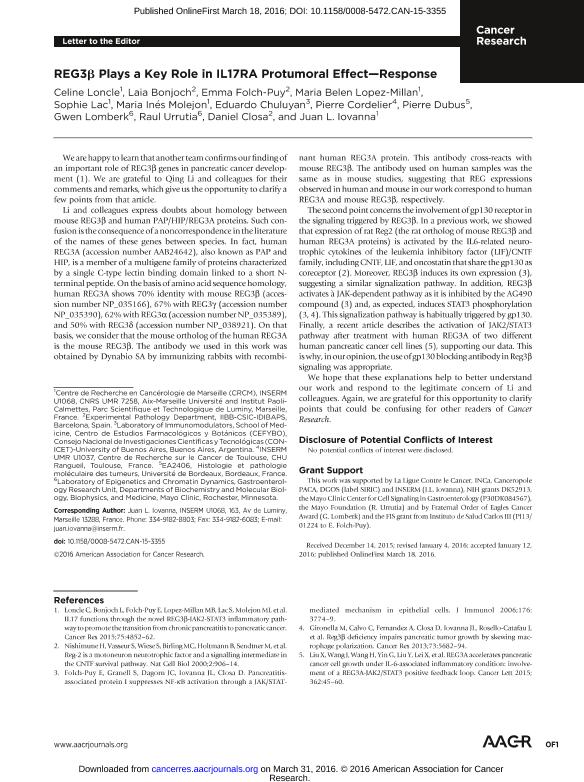Mostrar el registro sencillo del ítem
dc.contributor.author
Loncle, Celine
dc.contributor.author
Bonjoch, Laia
dc.contributor.author
Folch Puy, Emma
dc.contributor.author
Lopez Millan, Maria Belen
dc.contributor.author
Lac, Sophie
dc.contributor.author
Molejon, Maria Ines

dc.contributor.author
Chuluyan, Hector Eduardo

dc.contributor.author
Cordelier, Pierre
dc.contributor.author
Dubus, Pierre
dc.contributor.author
Lomberk, Gwen
dc.contributor.author
Urrutia, Raul
dc.contributor.author
Closa, Daniel
dc.contributor.author
Iovanna, Juan L.
dc.date.available
2018-03-20T16:22:30Z
dc.date.issued
2016-04
dc.identifier.citation
Loncle, Celine; Bonjoch, Laia; Folch Puy, Emma; Lopez Millan, Maria Belen; Lac, Sophie; et al.; REG3β plays a key role in IL17RA protumoral effect-response; American Association for Cancer Research; Cancer Research; 76; 7; 4-2016; 2051
dc.identifier.issn
0008-5472
dc.identifier.uri
http://hdl.handle.net/11336/39359
dc.description.abstract
We are happy to learn that another team confirms our finding of an important role of REG3β genes in pancreatic cancer development (1). We are grateful to Qing Li and colleagues for their comments and remarks, which give us the opportunity to clarify a few points from that article.Li and colleagues express doubts about homology between mouse REG3β and human PAP/HIP/REG3A proteins. Such confusion is the consequence of a noncorrespondence in the literature of the names of these genes between species. In fact, human REG3A (accession number AAB24642), also known as PAP and HIP, is a member of a multigene family of proteins characterized by a single C-type lectin binding domain linked to a short N-terminal peptide. On the basis of amino acid sequence homology, human REG3A shows 70% identity with mouse REG3β ( accession number NP_035166) , 67% with REG3γ (accession number NP_035390) , 62% with REG3α (accession number NP_035389) , and 50% with REG3δ (accession number NP_038921). On that basis, we consider that the mouse ortholog of the human REG3A is the mouse REG3β. The antibody we used in this work was obtained by Dynabio SA by immunizing rabbits with recombinant human REG3A protein. This antibody cross-reacts with mouse REG3β. The antibody used on human samples was the same as in mouse studies, suggesting that REG expressions observed in human and mouse in our work correspond to human REG3A and mouse REG3β, respectively.The second point concerns the involvement of gp130 receptor in the signaling triggered by REG3β. In a previous work, we showed that expression of rat Reg2 (the rat ortholog of mouse REG3β and human REG3A proteins) is activated by the IL6-related neurotrophic cytokines of the leukemia inhibitory factor (LIF)/CNTF family, including CNTF, LIF, and oncostatin that share the gp130 as coreceptor (2). Moreover, REG3β induces its own expression (3), suggesting a similar signalization pathway. In addition, REG3β activates à JAK-dependent pathway as it is inhibited by the AG490 compound (3) and, as expected, induces STAT3 phosphorylation (3, 4). This signalization pathway is habitually triggered by gp130. Finally, a recent article describes the activation of JAK2/STAT3 pathway after treatment with human REG3A of two different human pancreatic cancer cell lines (5), supporting our data. This is why, in our opinion, the use of gp130 blocking antibody in Reg3β signaling was appropriate.We hope that these explanations help to better understand our work and respond to the legitimate concern of Li and colleagues. Again, we are grateful for this opportunity to clarify points that could be confusing for other readers of Cancer Research.
dc.format
application/pdf
dc.language.iso
eng
dc.publisher
American Association for Cancer Research

dc.rights
info:eu-repo/semantics/openAccess
dc.rights.uri
https://creativecommons.org/licenses/by-nc-sa/2.5/ar/
dc.subject
Reg3
dc.subject
Cancer
dc.subject
Il-17
dc.subject.classification
Inmunología

dc.subject.classification
Medicina Básica

dc.subject.classification
CIENCIAS MÉDICAS Y DE LA SALUD

dc.title
REG3β plays a key role in IL17RA protumoral effect-response
dc.type
info:eu-repo/semantics/article
dc.type
info:ar-repo/semantics/artículo
dc.type
info:eu-repo/semantics/publishedVersion
dc.date.updated
2018-03-15T14:04:59Z
dc.journal.volume
76
dc.journal.number
7
dc.journal.pagination
2051
dc.journal.pais
Estados Unidos

dc.journal.ciudad
Filadelfia
dc.description.fil
Fil: Loncle, Celine. Aix-Marseille Université; Francia. Centre National de la Recherche Scientifique; Francia
dc.description.fil
Fil: Bonjoch, Laia. Consejo Superior de Investigaciones Científicas; España. Instituto de Investigaciones Biomédicas de Barcelona; España
dc.description.fil
Fil: Folch Puy, Emma. Consejo Superior de Investigaciones Científicas; España. Instituto de Investigaciones Biomédicas de Barcelona; España
dc.description.fil
Fil: Lopez Millan, Maria Belen. Consejo Superior de Investigaciones Científicas; España. Instituto de Investigaciones Biomédicas de Barcelona; España
dc.description.fil
Fil: Lac, Sophie. Aix-Marseille Université; Francia. Centre National de la Recherche Scientifique; Francia
dc.description.fil
Fil: Molejon, Maria Ines. Aix-Marseille Université; Francia. Centre National de la Recherche Scientifique; Francia. Consejo Nacional de Investigaciones Científicas y Técnicas; Argentina
dc.description.fil
Fil: Chuluyan, Hector Eduardo. Consejo Nacional de Investigaciones Científicas y Técnicas. Oficina de Coordinación Administrativa Houssay. Centro de Estudios Farmacológicos y Botánicos. Universidad de Buenos Aires. Facultad de Medicina. Centro de Estudios Farmacológicos y Botánicos; Argentina
dc.description.fil
Fil: Cordelier, Pierre. Centre de Recherche sur le Cancer de Toulouse; Francia. Inserm; Francia
dc.description.fil
Fil: Dubus, Pierre. Universite de Bordeaux; Francia
dc.description.fil
Fil: Lomberk, Gwen. Mayo Clinic; Estados Unidos
dc.description.fil
Fil: Urrutia, Raul. Mayo Clinic; Estados Unidos
dc.description.fil
Fil: Closa, Daniel. Instituto de Investigaciones Biomédicas de Barcelona; España. Consejo Superior de Investigaciones Científicas; España
dc.description.fil
Fil: Iovanna, Juan L.. Inserm; Francia. Centre National de la Recherche Scientifique; Francia. Aix-Marseille Université; Francia
dc.journal.title
Cancer Research

dc.relation.alternativeid
info:eu-repo/semantics/altIdentifier/url/http://cancerres.aacrjournals.org/content/76/7/2051
dc.relation.alternativeid
info:eu-repo/semantics/altIdentifier/doi/http://dx.doi.org/10.1158/0008-5472.CAN-15-3355
Archivos asociados
